Obsession (1976)
Directed by: Brian De Palma
Written by: Brian De Palma, Paul Schrader
Starring: Cliff Robertson, Geneviève Bujold, John Lithgow
HCF may be one of the newest voices on the web for all things Horror and Cult, and while our aim is to bring you our best opinion of all the new and strange that hits the market, we still cannot forget about our old loves, the films that made us want to create the website to spread the word. So, now and again our official critics at the HCF headquarters have an urge to throw aside their new required copies of the week and dust down their old collection and bring them to the fore…. our aim, to make sure that you may have not missed the films that should be stood proud in your collection. Here we have the second of our two early Brian De Palma movies and a personal favourite of Docs!
HCF REWIND NO.45. OBSESSION [1976]
AVAILABLE ON DVD AND BLU RAY
DIRECTED BY: Brian De Palma
WRITTEN BY: Paul Schrader, Brian De Palma
STARRING: Cliff Robertson, Genevieve Bujuld, John Lithgow, Sylvia Kuumba Williams
RUNNING TIME: 94 mins
REVIEWED BY:Dr Lenera, Official HCF Critic
In 1959, Michael Courtland, a New Orleans real estate developer, is in despair when his wife Elizabeth and young daughter Amy are kidnapped. The police strongly recommend that he provide the kidnappers with shredded blank paper instead of the demanded ransom, and he agrees to the plan. The angry kidnappers flee with their two captives and, after a car chase, all die in an explosion. 1975; despite it being fifteen years later, Courtland is still a devastated shell of a man, and regularly visits a monument he has had built in her memory, a monument which is a replica of the church where he and Elizabeth had met many years before in Florence, Italy. When his real estate partner Robert LaSalle convinces Courtland to tag along on a business trip back to Florence, Courtland revisits the church, and suddenly comes face to face with a young woman who is the spitting image of Amy, though her name is Sandra………..
Obsession is rarely mentioned as one of Brian de Palma’s best movies, and isn’t even that well known amongst his work, which for me makes it something of a neglected masterpiece. Well, maybe the word ‘masterpiece’ is overdoing it slightly, but I certainly consider Obsession to be a very fine movie indeed, a beautiful, haunting dream of a film that may not contain much in the way of the expected shocks or gore but doesn’t really need to. It has the feel of a 1940’s or 50’s movie, albeit with rather more experimentation than most, and of course is often regarded as a remake or a slavish imitation of Alfred Hitchcock’s great movie Vertigo. It is a fact that the inspiration for the movie came from a showing of the Hitchcock film that De Palma and writer Paul Schrader attended, at a time where Vertigo and several other films from the Master Of Suspense were virtually unavailable for viewing. Is it an actual remake? I would say not. It takes ideas from the 1958 picture, especially the central gimmick of a man losing a woman and then seeing another woman who looks just like her, but spins them off into a rather unique tale of its own. I would actually say De Palma’s lurid, fun 1984 movie Body Double is more of a Vertigo remake than Obsession ever was!
SPOILERS! There was considerable alteration from the written word to the screen. Originally Schrader envisaged Obsession as a movie far exceeding two hours and called Deja Vu. The finished film, in which Courtland twice suffers the horror of having a wife kidnapped, ends with a scene at an airport, but the original script continued the story for a third act, with Courtland in prison, Sandra in an asylum and a third kidnapping when they both get out and reunite. It was composer Bernard Herrmann who talked De Palma into jettisoning this final act, resulting in Schrader, who considered his script ruined, not having anything more to do with the film. Columbia were uneasy about the finished movie because of its incest element and in particular a scene [albeit totally un-explicit] where father and daughter go to bed. Said scene was shortened and re-edited so it became a dream scene, but Columbia still held onto Obsession for nearly a year before releasing it, where, to their surprise, it was a commercial success, though nothing like De Palma’s next film Carrie. SPOILERS END
The opening credits, which were actually suggested by the composer, immediately suck the viewer into Obsession’s spell. Against Herrmann’s short musical phrases where the orchestra [including an organ] is echoed by a chorus, we see a shot of a strange but rather beautiful church, the church which is pivotal in the film, and on the side of the screen snapshots from happy times in the life of Michael and Elizabeth Courtland. We cut to the outside of a large house in New Orleans and the music effortlessly eases into the sound of chirping crickets. The next twenty minutes pass by in an almost nightmarish rush; the story at this point may only be a relatively conventional kidnapping thriller, but Vilmos Zsigmond shoots everything in soft focus and Herrmann’s pounding music [this is no background score, this is a score that is as important a feature as the direction, the script and the acting, and I shall be referring to it a lot] helps give an impression of heightened reality. It is very noticeable that these scenes make little attempt to feature 50s cars, fashions etc, but then De Palma’s films rarely exist in the real world, and I love them for that!
Fast forward to 1975, and we have an absolutely brilliant transition, as we see Courtland’s memorial of Elizabeth being built and the camera slowly circles round it to take us into the present. The tomb looks worn and things have grown around it, but Courtland is the same haunted, morose figure, gazing forlornly at the memorial. Now Cliff Robertson has been much-criticised for his very restrained performance, but I think it is appropriate. Courtland is a broken man who, eighteen years later, is still consumed by the deaths of his wife and family and will just not enjoy life. He’s the kind of person who probably needs this obsession, otherwise he would probably kill himself. Robertson perfectly shows this in his performance, acting mostly with his eyes. Just look at them light up when he first talks to Sandra, it’s almost heartbreaking to see. Co-star Genevieve Bujold disagreed and thought Robertson didn’t show enough emotion, but said to Herrmann that he made love to her with his music!
Obsession spends its middle act floating slowly along, perhaps too slowly for some; anyone expecting typical De Palma fireworks may be disappointed. Even when we get into the final act, which speeds things up again and throws at us a twist which, despite the post-production edits made to the film, will certainly strike some as being rather sick, it’s all told with great taste. No sex, only one on-screen killing and only one scene with blood [and we only see it running under a door]! However the film has considerable grip and power if you just sit back and let its atmosphere wash all over you. Of course this being a De Palma film, there are certainly a few scenes which are ‘in your face’, such as some flashback scenes where the character doing the remembering seems to be both in the past and in the present.
Some of its best scenes are of a more restrained kind though, and with little or no dialogue. When Courtland first returns to Florence, he enters the church and the music combines a solemn plagal organ melody with caressing strings that perhaps depict the emotions going through his head, creating a ghostly ambience. Then the notes rise and, as the wordless chorus comes in, Courtland sees, in slow motion, what seems to be his dead wife resurrected, as if in a dream, in a moment of almost spiritual beauty. Later, when Sandra is alone in Courtland’s house [in scenes which are probably deliberately reminiscent of Rebecca], she enters one of those Forbidden Rooms all large old houses owned by strange obsessed protagonists have, and the camera slowly moves away from Sandra in the doorway, slowly round the room, taking in the ambience and the detail, going back pass the door, only this time missing Sandra because she has moved further into the room, but managing to catch her in a mirror. All the time, the wordless chorus cries and wails, repeating, as much of the score does, a simple two note phrase over and over again, helping create the sense of frozen time, of past slowly flowing into the present, of long-dead voices speaking in the mind.
Obsession has its problems; some of the edits in the final cut jar, the score was somewhat mucked around with, sometimes placing one track on top of another, and, while Genevieve Bujold is absolutely delightful in her dual role, John Lithgow seems far too young for his major part in the film. The overall plot does not entirely hold water when thought about. Despite all this, I love Obsession, with its slow grace and its delirious romanticism, similar to, and yet also distinct from, that of Vertigo. Somewhat bizarrely, despite the story, in the end, becoming even darker and more perverse than that of Vertigo [Obsession may end on a supposedly joyous embrace, but one knows that the protagonists have issues that will be incredibly hard to get over] Obsession is a more compassionate work. Vertigo’ s main couple may be more fully rounded protagonists but Michael and Sandra remain more sympathetic, despite some of the things they do. Obsession may not, in the end, have the complexity of Vertigo, but, if Vertigo did not exist, it would be a bloody good substitute.

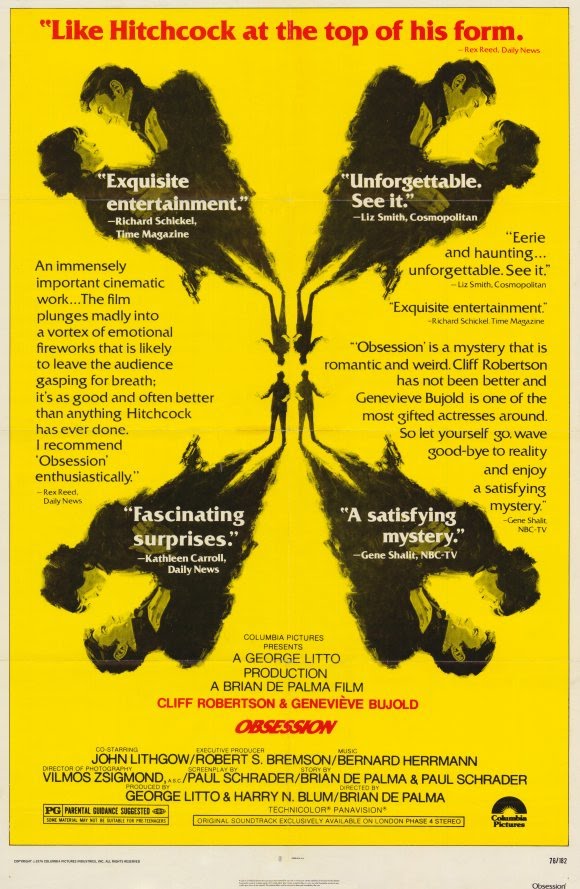
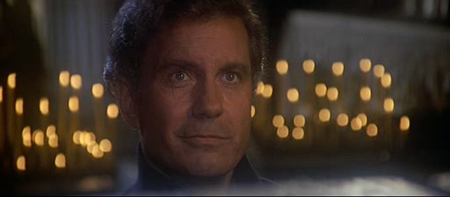
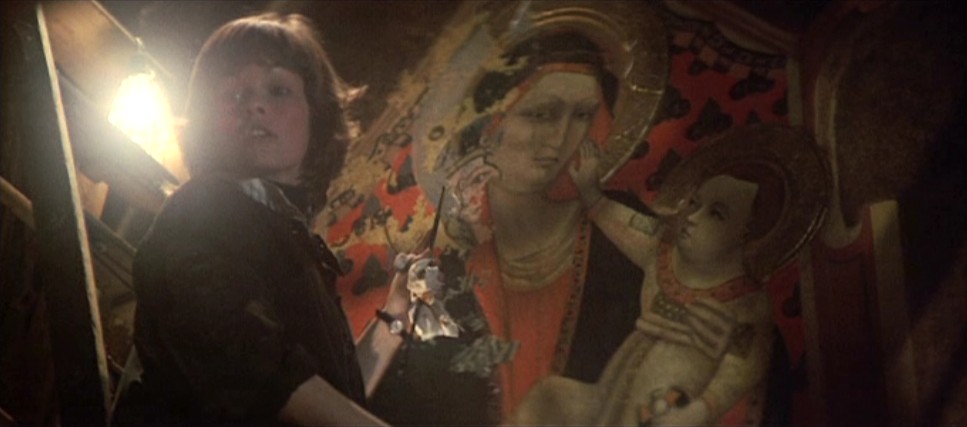




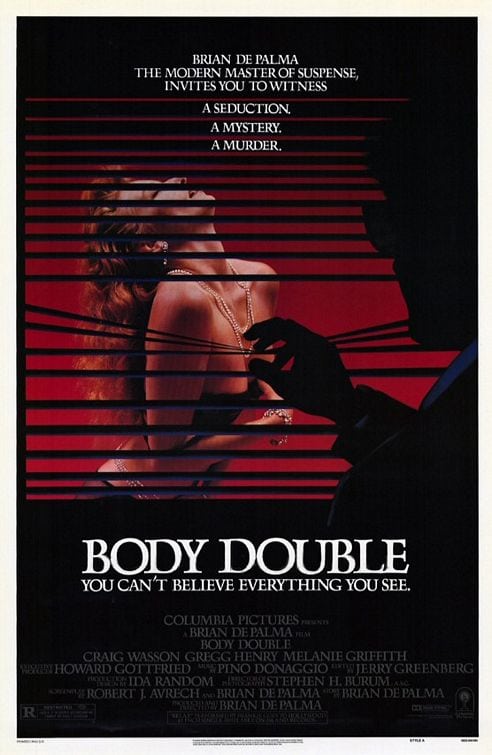
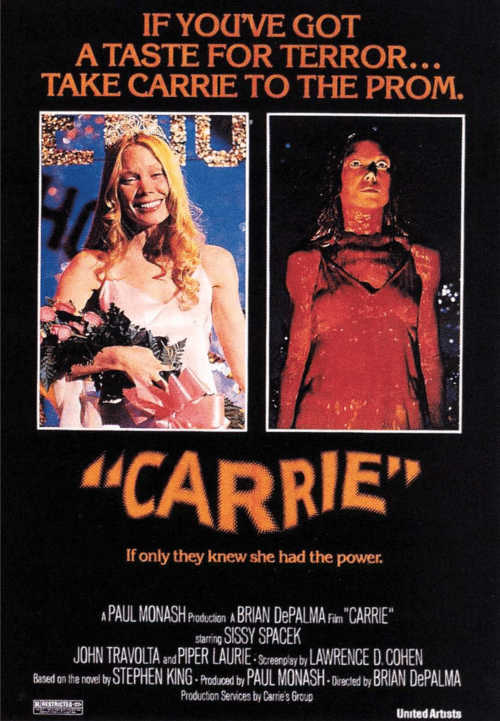
Be the first to comment